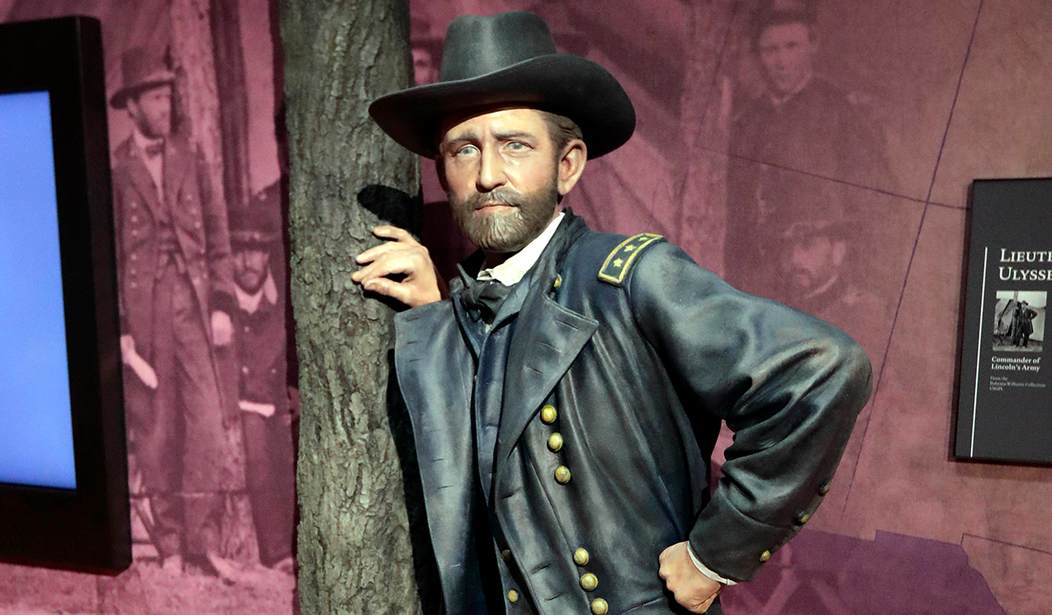Today, April 27, is the anniversary of the 1822 birth of one of the greatest U.S. presidents, Ulysses S. Grant. His great achievements as both general and president can remind us of the importance of never giving up, even against seemingly impossible odds.
Due to Confederate and Democrat propaganda and rewriting of history, Grant has in modern times usually not received the credit and praise he deserves. He is often falsely portrayed as a perpetual drunk, an inferior general, or a thoroughly incompetent president, none of which is true. Did he make serious mistakes, both as general and as president? Of course he did. There is not a single American hero, no matter how admirable, who did not make a few severe mistakes during his public career. But Grant was a brilliant general, a virtuous man, and arguably the greatest civil rights president in American history. He was a man who was loyal to a fault with friends and very forgiving toward his enemies, yet he also never gave up on a fight.
“The great distinguishing qualities of General Grant were truth, courage, modesty, generosity and loyalty,” said Major General Grenville M. Dodge. “He was loyal to every work and every cause in which he was engaged—to his friends, his family, his country and to his God, and it was these characteristics which bound to him with hooks of steel all those who served with him.”
Grant impressed most people with whom he had to deal. Abraham Lincoln became his very enthusiastic admirer, and even Charles Dana, the spy sent by the War Department to dig up dirt on Grant during the Civil War, became one of Grant’s most firm supporters. When Grant, much later on after his presidency, took a tour of the world, foreign leaders from Europe to Asia wanted to meet with him, talk with him, ask his advice, and even request his political mediation.
Grant not only had important achievements, he was always ready to forgive a man who had injured him or to accept an unlikely friend. He was ready to welcome back any Confederates who sincerely aimed to help reunion (at least one even worked in his administration). Not only that, Grant’s personal efforts to help native tribes (unfortunately, often against the efforts of others in the government) led one chief to tell the then-president that he hoped for Grant’s re-election.
Grant won the Civil War and helped support the 15th Amendment guaranteeing civil rights to all regardless of race as the Founders originally intended. He protected black Americans and white Republicans from Democrat violence while always trying to bring unity out of division. His greatest faults, probably, were the fact that he had a tendency to believe those around him to be honest, even when some of them were corrupt, and his occasionally overly optimistic belief that Confederates were willing to be loyal citizens when many of them were not. But even these faults reflect credit upon his own character (see "The Man Who Saved the Union: Ulysses Grant in War and Peace" by HW Brands for more information).
One story about the early days of Grant’s successful fighting during the Civil War illustrates Grant’s never-give-up attitude. It happened at the Battle of Shiloh, before Grant was in charge of all Union forces. Even bullish Gen. William Sherman thought after a bloody first day of fighting that the Union might need to retreat. Grant had a plan, though, and it would eventually prove successful, giving him the victory. From History Net:
Sherman was man enough to admit he was thinking in terms of retreat. He came to Grant under his tree in the rain with the idea of broaching the subject, as “the only thing just then possible, as it seemed to me, was to put the river between us and the enemy and recuperate.” At the last minute he became embarrassed and blurted out, “Well, Grant, we’ve had the devil’s own day, haven’t we?” A determined Grant, his mind already made up, responded, “Yes, lick ’em to-morrow, though.”…
[One] of Lew Wallace’s troops wrote, “No one talked of tomorrow. We knew we had to fight a victorious enemy who was expecting an easy ending to the battle, nothing less than an unconditional surrender, but we knew in our hearts that we were going to lick them.” And this second day’s fighting—rarely examined in detail or regarded as very important among historians—would be a major factor in the battle. If the first day put Grant in position to win the battle, the second day’s fighting would determine the extent of that victory.
Grant’s early life had not indicated what a hero he would become. Not one of the best students in his class at West Point, not enough appreciated by his commanders during the Mexican-American War, often failing at business ventures, and at one point struggling with alcoholism. Grant’s politics also changed over the years. Originally a Democrat who owned slaves at one point, and who originally did not care much about slavery, Abraham Lincoln and the Civil War changed him. He went on to become a Republican president with civil rights as the major focus of his presidency. He remained a dedicated Republican, convinced that Democrats would destroy the gains made toward progress and the healing of racial divisions.
We today can learn a lesson from US Grant. We can learn to persevere in fighting to save this nation, we can learn how to take a strong stand while still being ready to forgive, how to stand for the rights of ourselves and others effectively and confidently. Now, more than ever, as the Democrats again try to divide this nation, we should come together to preserve the best of America’s past while moving into a freer future.










Join the conversation as a VIP Member